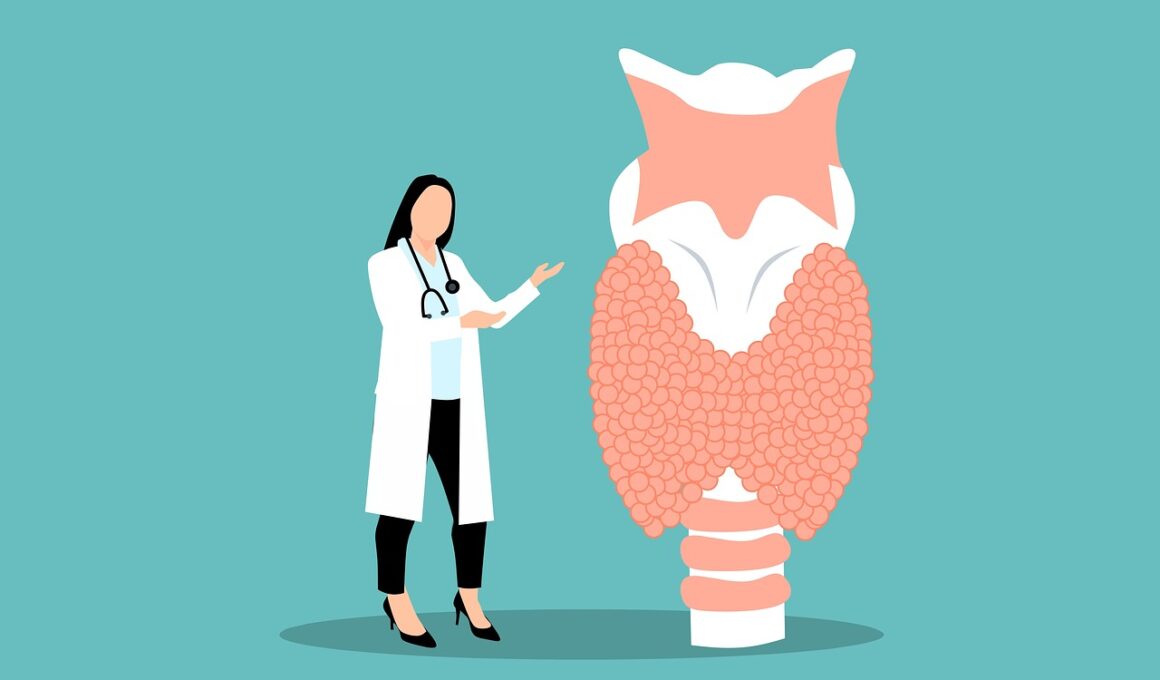Thyroid Hormone Replacement Therapy in Autoimmune Disease Management
Autoimmune diseases can often lead to the disruption of thyroid hormone production, resulting in various health issues. One crucial aspect of managing these conditions involves understanding the role of thyroid hormone replacement therapy. The therapy can help restore normal hormone levels, alleviating symptoms associated with thyroid dysfunction. It is particularly beneficial in autoimmune conditions such as Hashimoto’s thyroiditis and Graves’ disease. When hormonal balance is restored, patients may experience improved energy levels, mental clarity, and overall well-being. However, the approach to therapy may differ based on individual patient needs. Regular monitoring of hormone levels is essential to ensure optimal dosages of replacement therapy. Additionally, dietary interventions, supplements, and lifestyle changes can complement the treatment. Understanding the interplay between autoimmune diseases and hormone levels is vital in achieving effective management. Further studies emphasize the importance of personalized treatment plans that consider patient history and specific autoimmune disorders. Communication among healthcare providers, patients, and caregivers is critical in optimizing therapeutic outcomes. This holistic approach stands to improve life quality and overall health status for those grappling with autoimmune challenges.
The primary goal of thyroid hormone replacement therapy is to restore normal physiological function. For many individuals with autoimmune diseases, the body’s immune response can mistakenly target thyroid tissue, leading to insufficient hormone production. These patients often experience symptoms such as fatigue, weight gain, and depression. Thyroid hormone replacement can mitigate these effects by providing the necessary hormones that the body fails to produce. Levothyroxine is the most commonly prescribed medication for this purpose. Patients must follow their healthcare provider’s guidance regarding dosage and administration to maximize therapy effectiveness. Throughout treatment, monitoring TSH (Thyroid Stimulating Hormone) levels is crucial. This helps assess whether the prescribed dose is appropriate and effective. Additionally, the patient’s symptoms should be evaluated regularly to determine if any adjustments are needed. The success of replacement therapy also depends on lifestyle interventions, including a nutritious diet rich in essential vitamins and minerals. Patients should consider incorporating foods abundant in iodine and selenium. Engaging in regular physical activity can support both thyroid function and overall health. Adopting these measures alongside medication can provide a comprehensive approach to managing autoimmune-related thyroid issues.
Potential Side Effects of Thyroid Medications
While thyroid hormone replacement therapy is generally safe, some patients may experience side effects. These can range from mild to severe, depending on individual responses to medication. Common side effects include heart palpitations, anxiety, and heat intolerance. It is vital for patients to report any unusual symptoms to their healthcare provider immediately. Adjusting medication dosage may alleviate these side effects. In some cases, patients may require a different form of thyroid hormone, such as desiccated thyroid extract, which contains both T4 and T3 hormones. This alternative may suit individuals who do not respond well to levothyroxine. Regular follow-ups with healthcare providers are essential for evaluating therapy effectiveness and making necessary adjustments. Patients should also have ongoing communication about their symptoms and any lifestyle changes that might influence hormone levels. Potential drug interactions with other medications, especially those used to treat autoimmune diseases, must also be monitored. Unaddressed, these interactions can hinder therapy effectiveness. Therefore, a collaborative approach among healthcare teams can help manage risks, enhance treatment outcomes, and improve overall health for individuals with autoimmune conditions.
Diet and lifestyle modifications play a pivotal role in the management of autoimmune diseases alongside thyroid hormone replacement therapy. Patients are encouraged to adopt a nutrient-dense diet that supports thyroid function and overall immunity. Foods rich in antioxidants, such as fruits and vegetables, can help combat oxidative stress associated with autoimmune disorders. Additionally, consumption of healthy fats, such as omega-3 fatty acids found in fish and nuts, supports brain health and reduces inflammation. A gluten-free diet may also be beneficial for those with celiac disease or gluten sensitivity. Staying hydrated is crucial for overall well-being, so drinking sufficient water should be a priority. Regular exercise helps maintain healthy body weight, reduces fatigue, and enhances mental health. Mindfulness practices like yoga or meditation can significantly reduce stress, which may negatively impact autoimmune conditions. Sleep patterns also greatly influence hormonal health, as inadequate rest can exacerbate symptoms. Patients should aim for consistent sleep schedules and restful sleep environments. These combined efforts foster a holistic approach that supports the effectiveness of thyroid hormone replacement therapy. Taking small, sustainable steps can lead to substantial improvements in quality of life.
Monitoring and Adjusting Treatment Plans
Monitoring thyroid hormone levels is essential in managing autoimmune diseases effectively. Adjustments to medication dosages may be necessary based on regular blood tests. Such monitoring ensures that hormone levels remain within the normal range, preventing both hypothyroidism and hyperthyroidism. Patients should be aware of changes in their bodies, as symptoms often guide adjustments to treatment plans. Alongside laboratory values, discussing lifestyle factors that may influence hormone levels is equally important. Stress management techniques, dietary considerations, and physical activity habits can all affect thyroid function and overall well-being. Collaborating with a healthcare team allows for tailored adjustments based on each patient’s unique situation. Some individuals may require more frequent monitoring, especially during periods of transition, such as pregnancy or significant lifestyle changes. Ongoing education about autoimmune diseases and thyroid function can empower patients to take an active role in their health management. A proactive approach toward adjustments can dramatically enhance the effectiveness of therapy and improve patient quality of life. Patients should remain engaged in their treatment journey to ensure they receive the best possible healthcare outcomes.
In addition to traditional thyroid hormone replacement therapy, various complementary therapies may further support individuals with autoimmune diseases. Integrating treatments such as acupuncture, herbal remedies, and nutritional supplements can enhance overall wellness and complement medical management. However, patients should consult healthcare providers before initiating any complementary therapies. Some supplements may interact with prescribed medications, potentially affecting their efficacy. For instance, iodine supplementation must be approached cautiously, as excessive intake can trigger thyroid issues, particularly in autoimmune conditions. Probiotics are another area of interest, as gut health plays a crucial role in immune function. Additionally, vitamin D supplementation may assist individuals with autoimmune diseases due to its immune-regulating properties. Choosing high-quality supplements is essential to ensure their effectiveness and safety. Mind-body practices, including tai chi and qigong, can also promote relaxation and reduce stress, which may positively impact autoimmune symptoms. Engaging in community support groups can provide emotional relief and encourage healthy lifestyle changes. Ultimately, a well-rounded approach to health management will enhance the quality of life for those affected by autoimmune diseases.
Conclusion and Future Directions
In conclusion, thyroid hormone replacement therapy represents a key component of autoimmune disease management. Through effective treatment strategies, individuals can regain hormonal balance and improve their quality of life. Continued research is needed to explore the connections between autoimmune diseases and hormonal health. Future studies should focus on the effectiveness of various treatment combinations, considering the unique needs of each patient. The growing understanding of the gut-thyroid axis and its implications for thyroid health opens new avenues for treatment exploration. Furthermore, advancements in personalized medicine may lead to tailored therapies designed for specific autoimmune conditions. Emphasizing lifestyle and dietary approaches alongside medication can provide comprehensive care for individuals with thyroid dysfunctions. Regular communication between patients and providers is critical for adapting treatment plans to meet evolving needs. The journey toward mastery of managing autoimmune diseases can be complex, but awareness and education mark significant milestones in this process. Empowering patients with knowledge and tools for self-management ultimately fosters better health outcomes and experiences. Integrating both medical and holistic approaches will lead to lasting changes in managing autoimmune conditions effectively.
Through dedication and support, those navigating the challenges of autoimmune diseases can find hope and improved health. A collaborative, informed approach enhances patient experience and fosters resilience. By blending modern therapies with ancient wisdom, we pave the way for innovative healthcare solutions.





